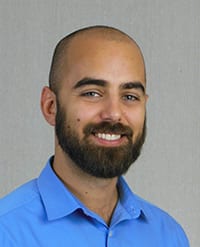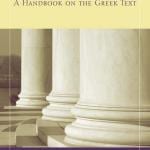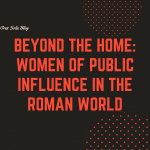I have gotten to know Bryan over the years and he has a knack for academic publishing. He has pretty good people skills (above average for academics!), a sharp sense for a fresh idea, and (gulp) he is not afraid to say “pass.”
True to his personality, in this interview Bryan is “to the point,” with incisive insight and a bit of dry wit. Enjoy!
I was asked to introduce pronunciation into my posts for readers from other countries, so expect to see these regularly now: [Bryan Dyer, pronounced /ˈbraɪən/ /ˈdaɪər/]
 Tell us about yourself and your background.
Tell us about yourself and your background.
Like many in our field, I am based in Grand Rapids, Michigan. I’m a native Michigander, born on the other side of the state, but I studied at Calvin College in Grand Rapids for my undergrad. My wife Anna and I have lived in Colorado where I did my MA (Denver Seminary) and Ontario where I did my PhD work (McMaster Divinity College). My dissertation was on suffering and death language in Hebrews (Suffering in the Face of Death [LNTS, 2017]) and I continue to work in Hebrews. My own interests focus on the development of early Christianity, especially within the context of Second Temple Judaism.
Few editors I know aspired to be in publishing. They sort of wandered into it and ended up enjoying it. How did you become an editor? What do you enjoy about it?
I started at Baker Academic in the marketing department in 2011—which was an amazing job for a PhD student (free books! Meet your heroes!). Once I got to know the industry, editing/acquisitions was clearly a much better fit to my interests and skill set. When I graduated in 2015, Baker had an opening for a NT editor and I’ve been in that role ever since. I did not pursue a PhD to become an editor, but have found the position to be challenging work that puts my degree to good use.
What are some things that stand out to you in a book conversation with an author or a book proposal that grab your interest?
It really depends on the type of project, but I’m generally interested in who is writing and what their argument is. Do they have a good sense of the field? Are they engaging with the right interlocutors? Is their argument well-reasoned with a clear thesis? If it is a textbook, is there obvious utility in the classroom? Does it add something that current textbooks in the discipline do not?
What are your book proposal pet peeves? And what are common, but correctable mistakes (more broadly) that authors make when trying to pitch their book idea?
A frequent problem I encounter is a lack of clarity regarding the audience for a project. It is not uncommon for a proposal to claim to be written for students and scholars and pastors and lay persons, etc. In trying to reach all these readers, a book usually ends up reaching none of them. I encourage prospective authors to clearly identify their audience and write with them in mind. Books can reach secondary markets (a technical volume can find use in the classroom; a popular-level book can impact the guild), but it’s best to identify your primary reader and focus your writing.
I often encourage young scholars to choose their projects deliberately and not attempt to publish too much too quickly. We rarely publish dissertations and I always advise recent PhD grads to take their dissertation to a monograph series like WUNT, SNTS, LNTS, etc. I guess a pet peeve of mine is when I’m told that “yes, it’s a dissertation. BUT it is really accessible and will appeal to a wide audience.” This is rarely the case. Dissertations by design are tightly focused and narrow in scope. My advice is to publish it in a top monograph series and then we can talk about book #2 once the monograph has had a chance to be received and engaged by your peers.
Talk about one or two books that you acquired or edited that you are especially proud of and why.
Two that came out this year are Bruce Longenecker’s In Stone and Story and Matthew Thiessen’s Jesus and the Forces of Death. They are very different books but are among the best I’ve been a part of. The first is a beautifully designed textbook intended to introduce students to the Greco-Roman world around early Christianity. The second offers a constructive argument regarding the Gospels’ portrayal of Jesus and ritual impurity. Both are written by top scholars offering significant contributions to the field and classroom.
In terms of recent acquisitions, we’ve signed up Eckhard Schnabel’s NT Theology, Emerson Powery on the Good Samaritan, Madison Pierce writing a Hebrews commentary, and a new commentary series for readers in spirit-filled traditions with Craig Keener and Holly Beers as editors. And maybe something from Nijay Gupta.
There are many good pieces of scholarship by biblical scholars, but we are not necessarily good at the art of writing. If you were to help an author improve their writing and communication skills, what would you recommend?
In addition to identifying your reader (see above), some of the best writers are those that have studied the craft of writing. To my mind comes Jonathan Pennington who, I know, reads widely and works hard at writing well—paying attention to his prose. In this vein, I recommend reading as much as you can of the type of project you’d like to write. If you are hoping to write a textbook for undergrads, find some examples that are out there and study them. What do they do well? What is unique about them?
I’ve also found that good textbooks come out of the classroom. They have been field tested on students. Your students will let you know what clicks and what doesn’t.
Explain how you define and interpret “success” in your industry?
I struggled with this question since there are several ways that I could go about it. I think that a successful book is one that contributes to the academic discussion and that has found its reader. In the first part of the response, I’m hoping to emphasize level of scholarship as a measure of success. If a book that we publish furthers the discussion and garners positive reviews and engagement, then I consider it a success. These books may not set sales records, but they have made an impact and are good publishing. The second half of my response does acknowledge the sales aspect. A successful book can also be one that garners a wide readership. The two things are not mutually exclusive—a “successful” book can be one or both things—but they do represent the thinking behind how we evaluate our publishing. There are, of course, other factors but those are the two that come to mind.
Can you give some thoughts and predictions about how publishing in biblical studies can and/or should change in the next 10 years?
Well, of course, right now no one knows what the classroom experience will look like in the fall and beyond. Will the shift to primarily online teaching impact how textbooks are accessed and utilized? Ebooks and online content are not new to publishers, but will the current context push more students to them than before?
Biblical studies publishing can and should publish more diverse voices. Publishers have historically lagged in this area, but we’ll hopefully see more and more projects from women and people of color. While true for our authors, the industry itself needs better representation. I hope that the outlook is much better 10 years from now.
I’m also of the (unpopular?) opinion that there is too much publishing. The number of books released each year is overwhelming as printing has become more accessible and just about every scholar has a hard drive full of material. In such a landscape, how does a book get noticed? How do you choose which publisher to go with? When anyone can publish anything, what even is the role of a publisher? We often talk in-house about being a “selective publisher”. We publish a certain number of books each year and we turn a lot of very good projects away. In being selective, we are saying, “these are the top books in the field.” Hopefully, publishing with Baker Academic means something. We place incredibly high value on our editorial process and our sales/marketing reach. These are ways that Baker Academic adds value to your book and why authors keep coming back to work with us. As the publishing landscape continues in the direction it’s been headed, I think more publishers will need to work hard to make the value they add tangible to prospective authors. There’s also a lot of cheap publishing out there so making the physicality of books a priority has become more and more important.
If you were wanting to invite “fresh talent” to publish with your press, what is your pitch (right here and right now!)? How do you express your press’ identity and purpose (don’t just recite it from a website) and how do you want to shape biblical studies?
Well, I certainly pitch the value that Baker Academic brings to their project. Our editorial process is the best among our competitors, and we place a lot of emphasis there. We regularly hear from seasoned authors that it was the best editorial experience they’ve had. I also stress the depth of our catalog and how we have expanded our program over the last two decades. Season after season we have the strongest offerings in New Testament, and I think that itself is a recruiting tool for up-and-coming scholars.
Baker Publishing is unique in that it is an independent, family-owned publisher with the sales/marketing networks that competes with any of the large, New York houses. Our academic division is one of seven, but it is foundational to the vision and mission of Baker Publishing. We serve the Kingdom by equipping scholars and students with high-quality writings that represent diverse interests within historic Christianity. You won’t get a more rigorous editorial process. You won’t find a better marketing and publicity reach. You’ll be publishing alongside top scholars in New Testament and among the finest scholarship in the field. Now how many books can I sign you up for?












